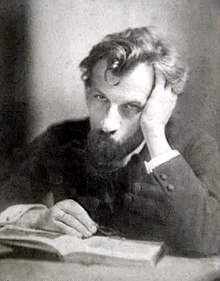Palestrina (opera)
| Palestrina | |
|---|---|
| Musikalische Legende by Hans Pfitzner | |

Hans Pfitzner, the composer of the opera, by Wanda von Debschitz-Kunowski, ca 1910
|
|
| Librettist | Hans Pfitzner |
| Language | German |
| Premiere | 12 June 1917 Prinzregententheater, Munich |
Palestrina is an opera by the German composer Hans Pfitzner, first performed in 1917. The composer referred to it as a Musikalische Legende (musical legend), and wrote the libretto himself, based on a legend about the Renaissance musician Giovanni Pierluigi da Palestrina, who saves the art of contrapuntal music (polyphony) for the Church in the sixteenth century, through his composition of the Missa Papae Marcelli. The wider context is that of the European Reformation and the role of music in relation to it. The character of Cardinal Borromeo is depicted, and a General Congress of the Council of Trent is the centrepiece of Act II.
The conductor of the premiere was Bruno Walter. On 16 February 1962, the day before he died, Walter ended his last letter with: "Despite all the dark experiences of today I am still confident that Palestrina will remain. The work has all the elements of immortality".
Claire Taylor-Jay has discussed Pfitzner's depiction of the political relationship between Palestrina and the Council of Trent, in the light of several German "artist-operas" such as Paul Hindemith's Mathis der Maler.Mosco Carner has written on Pfitzner's own expression of the role of spontaneous inspiration in composition, as expressed in Palestrina. Several scholarly articles have delved into Pfitzner's musical and ideological conservatism, as expressed in this opera. Gottfried Scholz has written of Pfitzner's depiction of the title character as a surrogate for himself. Karen Painter has discussed commentary on the opera in Nazi Germany.
The work was first performed at the Prinzregententheater, Munich on 12 June 1917. The title role was created by the tenor Karl Erb. Pfitzner wrote in his copy of the score:
...
Wikipedia
